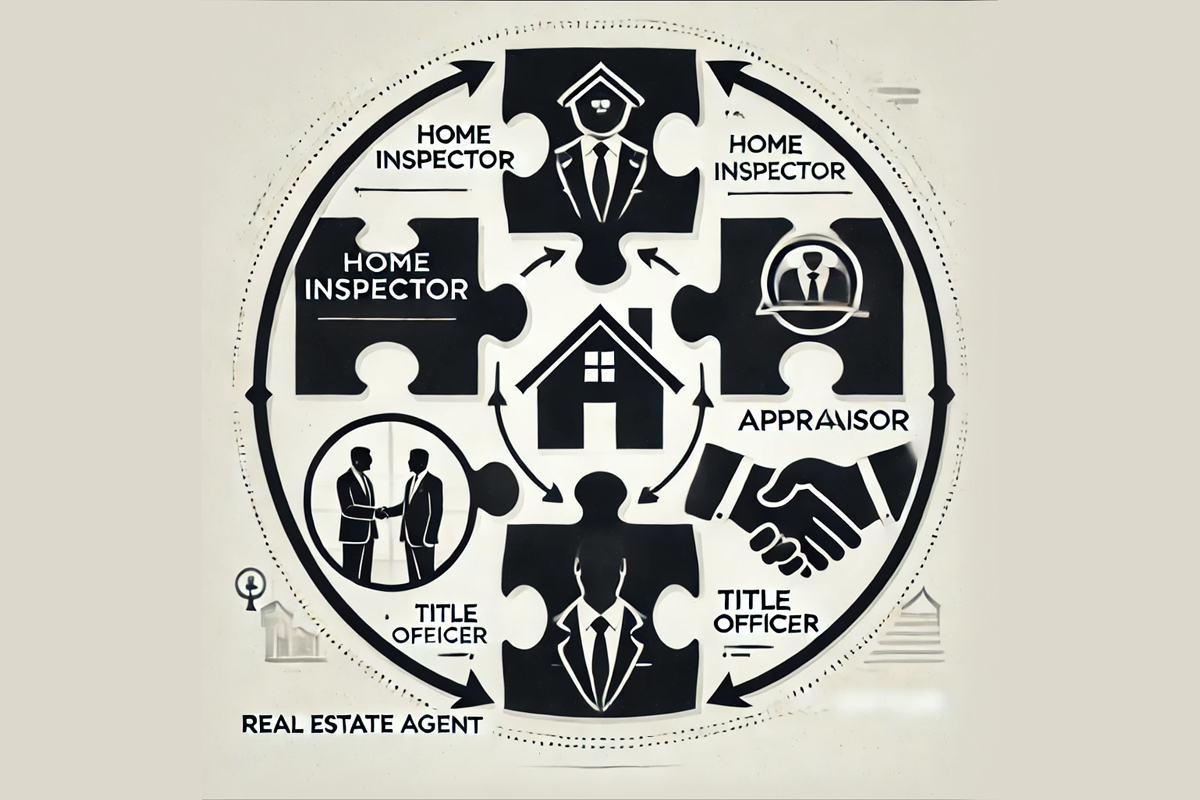Published by Karthik Subramaniam
Reading Time:11 minutes
The Hidden Influencers
How Home Inspectors, Appraisers, and Title Officers
Shape Real Estate Transactions
Want to be a top-performing real estate agent? Then you need to go beyond the basics of real estate license school and understand the practical roles of home inspectors, appraisers, and title officers. Mastering these collaborations is the key to smoother transactions, happier clients, and a stronger reputation.
Home Inspectors:
The Eyes That See What You Don’t

A home inspector’s job is to study a property’s condition from attic to basement. They look beyond the fresh paint to find what’s lurking underneath—whether it’s electrical issues, mold, or a leaky roof. Their findings help buyers understand what they’re getting into and allow sellers to fix problems before listing..
”
Imagine scheduling a home inspection and the inspector notices that the wooden deck, which looked sturdy at first glance, actually has rot hidden beneath the surface. The buyer, excited about spending summer afternoons grilling outside, may now feel uncertain. The buyer might have closed the deal without the inspector's report and faced expensive repairs later.
How Agents Can Collaborate Better:
- Attend the Inspection: Join your client at the property during the inspection. Seeing issues in person can help you explain them later and suggest solutions.
- Build a Reliable Network: It's crucial to have a shortlist of reputable inspectors who are thorough and precise in their reporting. If your go-to inspector is booked, having a backup ensures you can keep the transaction moving. This proactive approach can prevent delays and maintain the momentum of the deal.
- Set Proper Expectations: Remind clients that no home is perfect. Please encourage them to view the inspection report as a guide, not a reason to panic, and help them prioritize which repairs matter most.
Appraisers:
The Guardians of Value

Appraisers protect the buyer and the lender by ensuring the property’s value aligns with the purchase price. They assess everything from location to recent comparable sales to confirm that the agreed-upon figure is fair.
”
Suppose the home is a historic Craftsman with unique architectural details—hand-carved railings, stained-glass windows, and custom built-ins. The appraiser might not be thoroughly familiar with the premium buyers in your marketplace regarding such features, causing them to value the home too low. If the home appraises for $20,000 less than the agreed sale price, the lender may not cover the difference, putting the deal at risk.
How Agents Can Collaborate Better:
- Prepare a Property Fact Sheet: Create a detailed list of upgrades and unique features before the appraisal. Include items like a recently remodeled kitchen, a new energy-efficient HVAC system, or that rare stained-glass window.
- Share Relevant Comps: Provide recent comparable sales that highlight similar unique features. Show the appraiser examples of other historic homes that sold for a premium.
- Negotiate Professionally: If the appraisal comes in low, approach the appraiser politely with additional documentation or sales data. Be factual rather than emotional, and ask if they’d consider reviewing specific details to ensure the property’s value is accurately reflected.
Title Officers:
The Protectors of Ownership

Title officers confirm that the property’s legal ownership is evident. They search public records for liens, unpaid taxes, or boundary disputes. Their work ensures the buyer doesn’t inherit old legal problems and the new home.
”
Picture a property with a charming picket fence running along what everyone assumes is the backyard boundary. The title search reveals that the wall crosses into a neighbor’s lot by two feet. Without resolving this boundary dispute, the buyer might face legal hassles if the neighbor demands that the fence be moved or torn down.
How Agents Can Collaborate Better:
- Disclose Known Issues Upfront: If the property has a shared driveway, an old easement, or a fence that might not be placed correctly, tell the title officer immediately. This can speed up the resolution process.
- Get Title Work Started Early: Begin the title search once you list the property or enter escrow. Early discovery of title problems gives everyone time to find solutions and avoid last-minute delays.
- Explain Complex Matters: Break down real estate jargon for your clients. If they face a boundary dispute, for example, talk them through their options. Negotiating a written agreement with the neighbor is the most straightforward fix. Your guidance helps them stay calm and informed.
Why These Roles Matter More Than You Think
Agents are the most visible players, but these hidden influencers quietly shape every transaction. Consider these real-life scenarios:
- Inspection Scenario: A buyer loves a home’s hardwood floors and sunny kitchen. The inspector, however, discovers faulty plumbing that needs a complete overhaul. Thanks to the inspector, the buyer can potentially negotiate a repair or a monetary credit before finalizing the sale, saving them thousands of dollars and future headaches.
- Appraisal Scenario: A seller is thrilled by a high offer, but the appraiser values the home lower than expected. Instead of the deal collapsing, you provide the appraiser with proof of recent renovations and highlight comparable historic homes that sold at a higher price. The appraiser reevaluates and adjusts the value closer to the offer, keeping the transaction on track.
- Title Scenario: A title search uncovers an unexpected lien from a previous owner’s unpaid contractor bill. Rather than panicking, you work with the title officer to resolve it. By quickly contacting the contractor and arranging for the lien to be paid off through the closing proceeds, you prevent last-minute delays and maintain your client’s trust.
These examples show the difference a proactive, informed agent can make when working with inspectors, appraisers, and title officers. Their work might happen behind the scenes but affects the deal front and center.
Addressing Potential Challenges with Concrete Solutions
Working with these professionals isn’t always smooth sailing. Issues like scheduling conflicts, delays, or differences of opinion are common. Here are some actionable strategies to help you navigate these challenges:
- Scheduling Conflicts: If your go-to home inspector is booked, have a backup inspector you trust. Keep a short list of reliable professionals so you can switch gears quickly. If an appraiser can’t visit for two weeks, let your clients know immediately and consider requesting a rush service (if available), or look for a different appraiser approved by the lender.
- Differences of Opinion on Property Condition: If a home inspector labels a roof as “near the end of its life,” but the seller disagrees, arrange for a second opinion from a roofing specialist. Present both expert views to the parties involved and encourage them to find a middle ground—maybe a partial credit or shared repair costs.
- Delays in Obtaining Reports: If the title officer uncovers a boundary dispute that takes time, explain the situation clearly to your clients. If helpful, show them documents or maps. Suggest steps like hiring a land surveyor to confirm property lines. This adds transparency and builds confidence that you’re actively working toward a solution.
- Explaining Complex Issues: Avoid jargon when dealing with legal or valuation matters. For example, if there’s a lien on the property, define it: “There’s an unpaid debt that needs to be cleared before you can legally own this home.” Propose specific steps (within your authority as a real estate agent) to resolve it, such as negotiating with the lienholder or having the seller settle the debt at closing.
- Negotiating with Appraisers: If you believe the property’s unique features weren’t fully considered, prepare a package of documentation—photos, receipts for improvements, local market studies—and politely ask the appraiser to review them. Show that you respect their expertise while providing information they may have missed.
Elevating Your Professionalism and Value
By understanding the work of these hidden influencers, you become an agent who can anticipate issues and solve problems rather than just reacting to them. Clients trust agents who can calmly guide them through inspections, appraisals, and title searches. They appreciate someone who can handle unexpected hiccups and explain complex matters in an easy-to-understand way.
As a real estate agent, your ability to collaborate with home inspectors, appraisers, and title officers can be the difference between a deal that falls apart and one that closes seamlessly. Remember, "Success is where preparation and opportunity meet." By understanding these hidden influencers and mastering the art of collaboration, you’ll be better prepared to navigate challenges and build lasting trust with your clients.
Take a moment to reflect on your own practices. Are you building strong relationships with these professionals? Are you taking proactive steps to address potential hurdles? Share your experiences and strategies with your colleagues—it’s through collaboration and learning from one another that we all grow stronger in this industry.
Now, go out and make your next transaction your smoothest one yet. Your clients—and your reputation—will thank you for it.
Love,
Kartik


